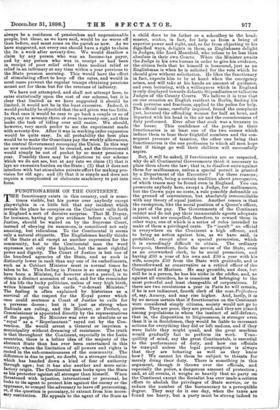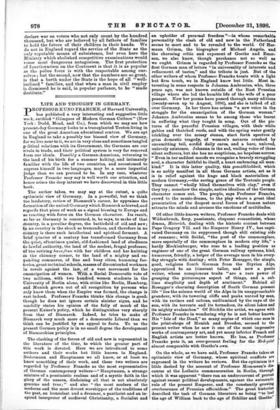FUNCTIONARISM ON THE CONTINENT. T HE functionary exists in this country,
and is some- times visible, but his power over anybody except playwrights is o little felt that any incident which reveals the place he occupies on the Continent calls forth in England a sort of derisive surprise. That M. Dupuy, for instance, having to give evidence before a Court of Justice, should be waited on by the Supreme Court, instead of obeying its summons, is considered not only amazing, but ridiculous. To the Continental it seems only a natural etiquette. The Englishman hardly thinks of the State at all except as another expression for the community, but to the Continental man the word expresses not only the highest, but the most rightful power and dignity. The Court of Justice is but one of the hundred agencies of the State, and as such is distinctly lower in rank than any one of its embodiments, such as a Cabinet Minister must in normal times be taken to be. This feeling in France is so strong that to have been a Minister, for however short a period, is to obtain a distinct accession of rank, and for the remainder of his life the lucky politician, unless of very high birth, writes himself upon his cards " ci-devant Ministre." The feeling is often explained by historians as a survival of the respect for the Royal power which once could sentence a Court of Justice to exile for a perverse decree ; but it is just as strong when Radicals are ruling, and the Minister, or Prefect, or Commissioner is appointed directly by the representatives of the people. No Minister was ever so absolute or so "royal" as a " Representant" rayed out by the Con- vention. He would arrest a General or imprison a municipality without dreaming of resistance. The truth is that throughout the Continent, especially in the Latin countries, there is a loftier idea of the majesty of the abstract State than has ever been entertained in this country, where the limitation of all powers and rights is rooted in the sub-consciousness of the community. The difference is due in part, no doubt, to a stronger tradition which has handed down a kind of fear of authority through ages ; but it has also another and more satis- factory origin. The Continental man looks upon the State as his protector against all stronger than himself. When threatened with injustice, international or personal, he looks to its agent to protect him against the enemy or the Oppressor, to compel the adversary to leave off persecuting, or, if the question is pecuniary, to extract from him neces- sary restitution. He appeals to the agent of the State as a child does to its father or a schoolboy to the head- master, wishes, in fact, for help as from a being of superior power and right, and, so far from objecting to his dignified ways, &lights in them, as Englishmen delight in Judges, like Lord Mansfield, who refuse to be less than absolute in their own Court3. When the Minister awaits the Judge in his own bureau in order to give his evidence, the citizen feels that he himself is honoured, just as an Englishman is when he is solicited for the vote which he should give without solicitation. He likes the functionary in fact, expects him to be at hand when the emergency arises, and will take at his hands an amount of guidance, and even lecturing, with a willingness which in England is only displayed towards didactic Stipendiaries or talkative Judges of the County Courts. We believe it is true that on one occasion an English resident in Berlin, finding his cook perverse and fractious, applied to the police for help. The official .came, carefully inquired, found the complaint just, lectured the offending woman for half an hour, and departed with his head in the air and the consciousness of duty performed. Ever after that cook was a treasure in the house. This confidence of the people in their functionaries is at least one of the two causes which induce them to bear their frightful numbers and the con- sequent pressure of taxation, the other one being that functionarism is the one profession to which all men hope that if things go well their children will successfully aspire.
But, it will be asked, if functionaries are so respected, why do all Continental Governments think it necessary to place them above the law ; that is, to disallow suits against them for malfeasance, unless a special permit is granted by a Department of the Executive ? For three reasons ; one, no doubt, being a certain tradition about prerogative, of which traces may be found even in England. You can prosecute anybody here, except a Judge, for malfeasance, but the Crown pays no costs, a rule possibly defensible on the ground of convenience, but absolutely irreconcilable- with any theory of equal justice. Another reason is that the exemption, like the social position of a Queen's officer, is part of the pay. The Governments of the Continent cannot and do not pay their innumerable agents adequate salaries, and are compelled, therefore, to reward them in other ways, one of which is a series of rules intended to make of them a privileged caste. To "insult" an official is everywhere on the Continent a high offence, and. to bring an action against him, as we have said, is prohibited, except after a special permission, which it is exceedingly difficult to obtain. The ordinary bourgeois, therefore, feels the service of the State, even as an overworked clerk, to be social promotion, and having £50 a year of his own and £50 a year with his wife, accepts £50 from the State with gratitude, and is thenceforward as conservative as a retired officer of the Coastguard or Marines. He may grumble, and does, but still he is a person, he has his niche in the edifice, and, as against all outsiders, he is conscious of belonging to the most powerful and least changeable of corporations. If there are two revolutions a year in Paris he will remain, if he is not indiscreet, fourth clerk of the sous-Prefecturo of, say, Annecy, and may rise higher. And, lastly, it is by no means certain that if functionaries on the Continent were considered simply citizens, society would not go to pieces. They are poor, they are proud, and they are placed among populations in whom the instinct of self-defence, that is, the disposition to litigiousness, is stronger even than it is in Scotchmen, they would be liable to incessant actions for everything they did or left undone, and if they were liable they might quail, and the great machine would gradually fail to perform its work. Tran- quillity of mind, say the great Continentals, is essential to the performance of duty, and how can officials be tranquil unless the legal presumption is always that they are behaving as well as they know how ? We cannot let them be subject to threats for merely doing their duty. There is something in this argument, though it throws over the officials, and especially the police, a dangerous amount of protection ; and, at all events, it weighs so heavily that no party on the Continent except the Socialist has ever made a serious effort to abolish the privileges of State service, or to reduce the number of the bureaucracy to a perceptible degree. They may do it one day, when the taxes are found too heavy, but a party must be strong indeed to declare war on voters who not only count by the hundred thousand, but who are believed by all fathers of families to hold the future of their children in their hands. We do not in England regard the service of the State as the only reputable means of subsistence, but even here the Ministry which abolished competitive examinations would rouse most dangerous antagonism. The first protection of functionarisin on the Continent is that it is as popular as the police force is with the respectable among our- selves; but the second, now that the numbers are so great, is that a berth under the State is the hope of all "well- inclined" families, and that when a man in civil employ is dismissed he is said, in popular parlance, to be "made destitute."



































 Previous page
Previous page